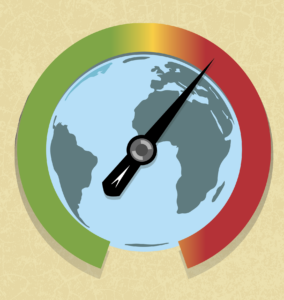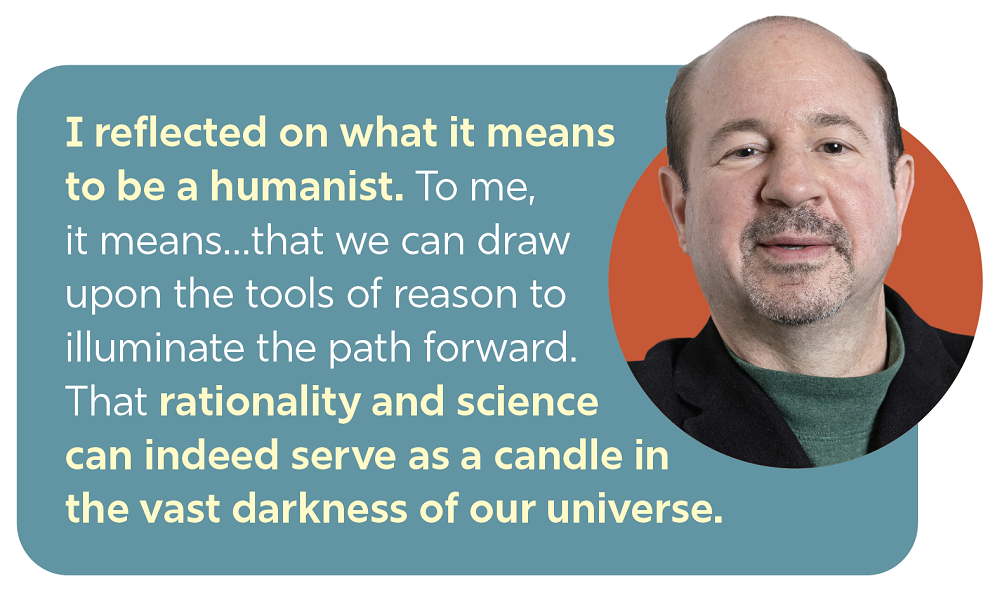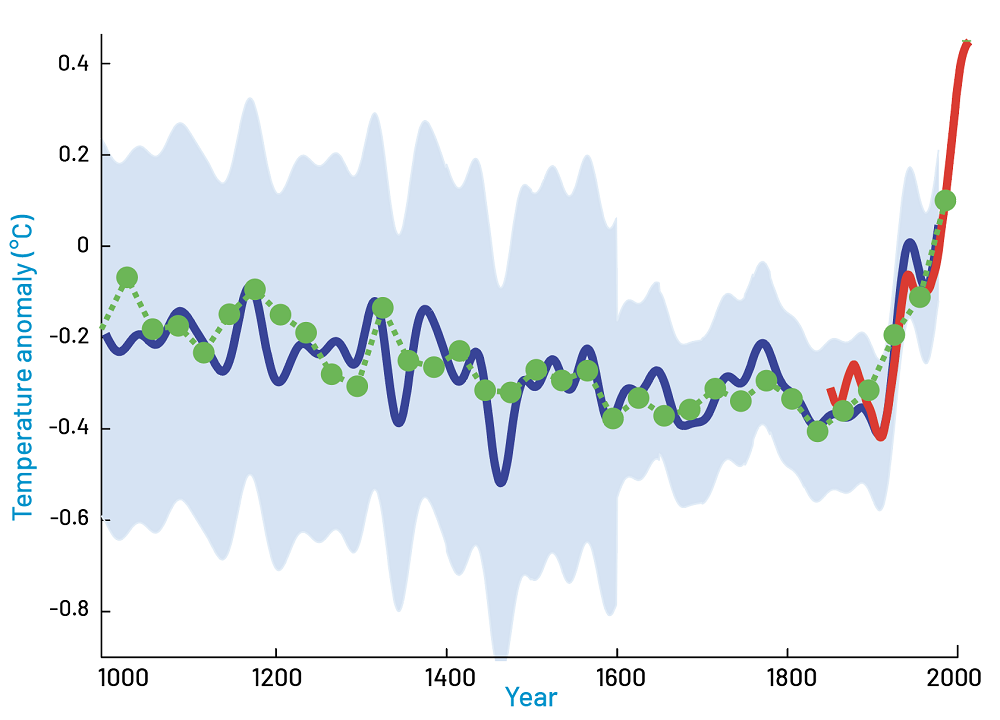The Fragility of Truth in the Existential Crisis

Dr. Michael E. Mann is Presidential Distinguished Professor in the Department of Earth and Environmental Science at the University of Pennsylvania, with a secondary appointment in the Annenberg School for Communication. He is director of the Penn Center for Science, Sustainability, and the Media (PCSSM). After receiving his undergraduate degrees in Physics and Applied Math from the University of California at Berkeley, and an M.S. degree in Physics from Yale University, he earned a Ph.D. in Geology & Geophysics from Yale University. His research interests include the study of Earth’s climate system and the science, impacts and policy implications of human-caused climate change. He first rose to prominence in 1998 as the author of the “hockey stick graph” which showed the rapid warming of temperatures in the Northern Hemisphere in the late 20th Century compared to a thousand-year period. Despite significant attempts by climate-change deniers to debunk the report and smear Dr. Mann’s scientific reputation, his findings have been repeatedly validated.
Dr. Mann was a Lead Author on the Observed Climate Variability and Change chapter of the Intergovernmental Panel on Climate Change (IPCC) Third Scientific Assessment Report in 2001 and was organizing committee chair for the National Academy of Sciences Frontiers of Science in 2003. He contributed, with other IPCC authors, to the award of the 2007 Nobel Peace Prize. The recipient of numerous awards and accolades, he was elected to the U.S. National Academy of Sciences in 2020 and is a Fellow of the American Geophysical Union, the American Meteorological Society, the Geological Society of America, the American Association for the Advancement of Science, and the Committee for Skeptical Inquiry. He is also a co-founder of the award-winning science website RealClimate.org.
Dr. Mann is author of more than 200 peer-reviewed and edited publications, numerous op-eds and commentaries, and five books including Dire Predictions: Understanding Climate Change; The Hockey Stick and the Climate Wars: Dispatches from the Front Lines; The Madhouse Effect: How Climate Change Denial is Threatening our Planet, Destroying Our Politics, and Driving Us Crazy; The Tantrum that Saved the World; and The New Climate War: The Fight to Take Back Our Planet.
Dr. Mann received the American Humanist Association’s Humanist of the Year Award at the 82nd Annual Conference in Denver, CO in May. This text is excerpted from his acceptance speech.
I COULDN’T BE MORE HONORED to be named Humanist of the Year by the American Humanist Association.
I want to offer special thanks to the awards committee. And of course, my family, and the countless friends and colleagues who have provided me with support, counsel, and friendship over the years.
When I look at the list of past recipients, it reads like a who’s who of my personal heroes and role models. Folks like Tony Fauci, Stephen Jay Gould, Margaret Atwood, Isaac Asimov, Jonas Salk, Buckminster Fuller, Margaret Sanger. And, of course, Carl Sagan. I’ll have more to say about him later. I’m delighted to see some personal friends on the list of past awardees, including Bill Nye, Congressman Jared Huffman, and science journalist Jennifer Ouillette.
And I have to say, I’m reassured to see certain past awards have been retracted. To quote the influential thinker Stan Lee, with great power comes great responsibility. There is a rightful expectation that those who are bestowed such accolades will continue to honor the values that undergird them.
While we’re on the topic of “values”, I must confess that when I was first contacted about the prospect of being awarded Humanist of the Year, I did have to ponder the implications of accepting the award. While I myself am agnostic about the existence of a creator—like Sagan, I see no evidence for one, and no need to invoke one to explain our world and the universe—I also recognize, as Sagan did, that people of faith are an important part of the coalitions that exist to advance many of the causes—such as environmental preservation—that I hold dear. I see no reason to provoke and alienate these allies.
I reflected on what it means to be a humanist. To me, it means that we can find meaning in the human condition, without appealing to the supernatural—deities, demons and angels, heaven and hell…an afterlife. It means that we can draw upon the tools of reason to illuminate the path forward. That rationality and science can indeed serve as a candle in the vast darkness of our universe.
Consider the great physicist Leo Szilard. He was the recipient of this award in 1960. Szilard was a great physicist. But more importantly, he was a great human being. He used his brilliant mind not only to solve fundamental problems in physics but to fight back against a rising tide of fascism in the 1930s. Nearly a century later, that battle is self-evidently not over.
Szilard founded the Council for a Livable World in 1962. That battle too is unfortunately not over, as we deal simultaneously with the threats of an unprecedented pandemic, renewed nuclear tensions, and the greatest crisis of all—the climate crisis.
I was humbled to receive the Leo Szilard award of the American Physical Society last year for my own science outreach efforts. As it happens, I got my start in the same sub-field as Szilard, statistical physics. Depending on your perspective I either saw the light, or lost my way. Mid-PhD I set out on a self-avoiding random walk (a gratuitous statistical physics reference—sorry!). I ended up applying my math and physics training to problems in the burgeoning field of climate science.

Ultimately my forays would lead to the now iconic “hockey stick” curve, which illustrates the unprecedented warming of recent decades. We first published the hockey stick in the journal Nature on April 22nd (Earth Day) 1998. So it just celebrated its 25th birthday. The hockey stick is based on natural recorders of climate called “proxy” records such as tree rings, corals, and ice cores, which stretch centuries back in time beyond the relatively short instrumental record of the past century and a half. Using a large set of proxy records spanning the globe, we reconstructed Earth’s temperature changes over the past six centuries and then a year later, the past 1000 years. The resulting plot, with its upturned “blade” characterizing the dramatic warming of the past century, tells a simple story—that we are causing profound changes in our climate through the continued burning of fossil fuels. That made it inconvenient to fossil fuel interests and the conservative politicians and media outlets that promote their agenda. And I would find myself at the very center of the fractious debate over human-caused climate change.
Climate change deniers spent decades trying to discredit the hockey stick, often by going after me personally. Yet twenty-five years later, there is a veritable hockey league—dozens of independent reconstructions of past temperature change that not only reaffirm our original findings but extend them. The latest studies now suggest that the warming of our planet in recent decades is unprecedented in tens of thousands of years and perhaps hundreds of thousands of years. We are engaged in an unprecedented and uncontrolled experiment with the only planet we know that can serve as a home for us and other living things. There is, as they say, no “planet B”.
Despite the bruising battles as I’ve sought to defend the science of climate change—including my own work—from attacks by vested interests aiming to discredit it, I consider myself privileged to have found myself in a position to influence the public discourse over the greatest challenge we face as a civilization.
Efforts to attack and deny the scientific evidence for human-caused climate change have long constituted a major impediment to action. But, as I argued in my book The New Climate War, we appear now to be moving past outright denial of the basic science as the evidence becomes plain to the person on the street in the form of the unprecedented heat waves, droughts, wildfires, floods, and superstorms we are now witnessing.
We still, however, face a multi-pronged strategy by polluters and their enablers in the media and pundit class to distract, deflect, attack, divide, and delay. Among their preferred tactics today is the promotion of risky, unproven strategies, such as geoengineering or massive carbon capture and sequestration, and the promise of future action as an excuse for business-as-usual fossil fuel burning today.

The famous “hockey stick graph” developed by Michael Mann, Raymond Bradley, and Malcolm Hughes and first published in Nature in 1999. The smooth curve in blue shows northern hemisphere temperatures over a period of 1,000 years. Its uncertainty range is in light blue, which is overlaid with green dots showing a 30-year global average. The red curve shows measured global mean temperature since the Industrial Revolution. This chart featured prominently in the 2006 documentary An Inconvenient Truth.
There is still time for us to avert the worst impacts of climate change if we act now and we act boldly, but there is no time left for dead ends, wrong turns and false solutions. We have the technology—in the form of renewable energy, storage technology, and efficiency and conservation measures. The only obstacles at this point aren’t the laws of physics, but the flaws in our politics.
The past offers us many lessons indeed when it comes to the defining challenges of our time. We must learn from those lessons and share them with the public, through every means available to us. Indeed, it is the theme of my forthcoming book Our Fragile Moment: How Lessons from Earth’s Past Can Help Us Survive the Climate Crisis.
Last year I received an honorary degree at UC Louvain in Belgium. The theme of the ceremony was “La fragilite du vrai”—“the Fragility of Truth”.
I can’t imagine a more poignant theme given the crossroads we are at today. For the “Fragility of Truth” is more evident than it has ever been. And that fragility now poses an existential threat to society, human civilization, and indeed our planetary home.
More than two decades ago the great Carl Sagan—an Earth and Planetary scientist—and perhaps the greatest science communicator of our generation, warned in his masterful tome The Demon-Haunted World, of a time in his children or grandchildren’s future…
A time when “awesome technological powers are in the hands of a very few, and no one representing the public interest can even grasp the issues; when the people have lost the ability to set their own agendas or knowledgeably question those in authority.” When “our critical faculties in decline…we slide, almost without noticing, back into superstition and darkness.”
He feared a “dumbing down…most evident in the slow decay of substantive content in the enormously influential media, the 30 second sound bites (now down to 10 seconds or less), lowest common denominator programming, credulous presentations on pseudoscience and superstition, but especially a kind of celebration of ignorance”.
Alas, Carl Sagan’s first grandchild was born into the very era he foretold. His daughter Sasha—a friend of mine, a deep thinker and talented author in her own right—gave birth to his first granddaughter just a few years ago.
Our ongoing reliance on fossil fuels is, in fact, at the root of the twin battles we are fighting right now. A battle, on the one hand, to defend the fledgling democracy of Ukraine—and indeed western democracy itself—from a brutal, barbarous assault by an authoritarian petrostate led by a ruthless despot, Vladmir Putin. And there is of course, the greatest battle of all, the battle to avert catastrophic climate change, while there is still time. That battle has been made all the more challenging by rampant disinformation—by polluters and special interests, by right wing politicians, conservative media, and bad state actors like Russia that have flooded our online information ecosystem with falsehoods and outright lies.
Social media—the primary means by which many people obtain their daily diet of information—have increasingly been weaponized by bad actors for nefarious purposes, to undermine faith in governmental and civic institutions, our traditional media, expert opinion and, yes, scientists—whose views and findings might prove inconvenient to their political, financial, or ideological agenda. That includes public health experts like Anthony Fauci—the last recipient of this award—who have provided informed advice on how to deal with an unprecedented pandemic. And it includes climate scientists offering our informed advice on the climate crisis.
Our mission as scientists, academics, thought leaders—indeed, as humanists—has literally never been more important than it is right now. We must step up and do battle in what is a genuinely Tolkienesque assault on science, reason, and fact-based discourse.
Truth has never been more fragile. Nor has our planet. It is up to all of us to defend both before it is truly too late.
